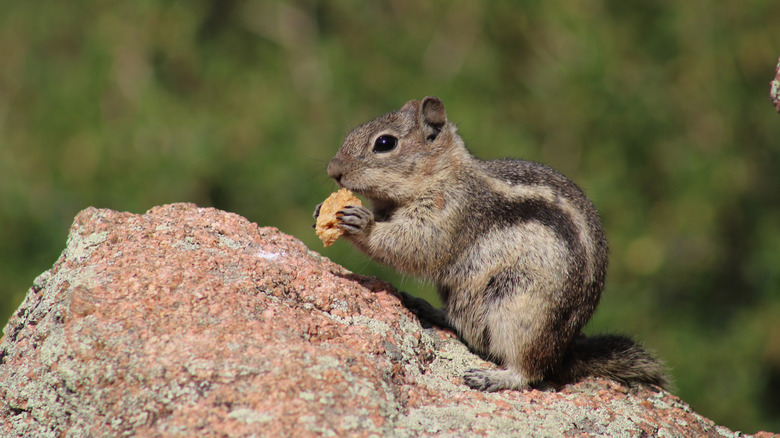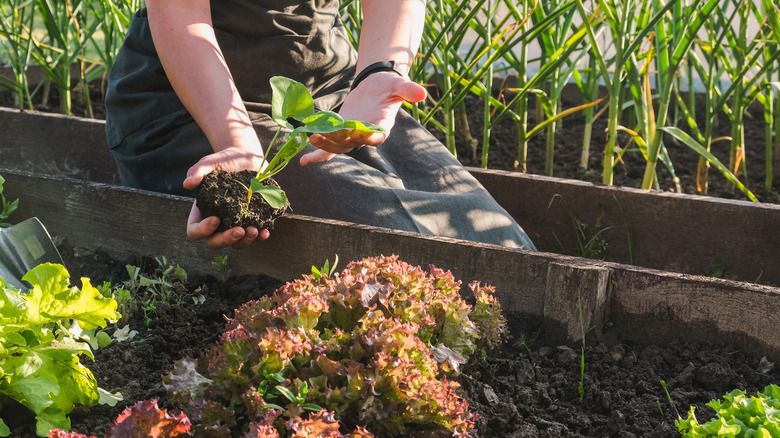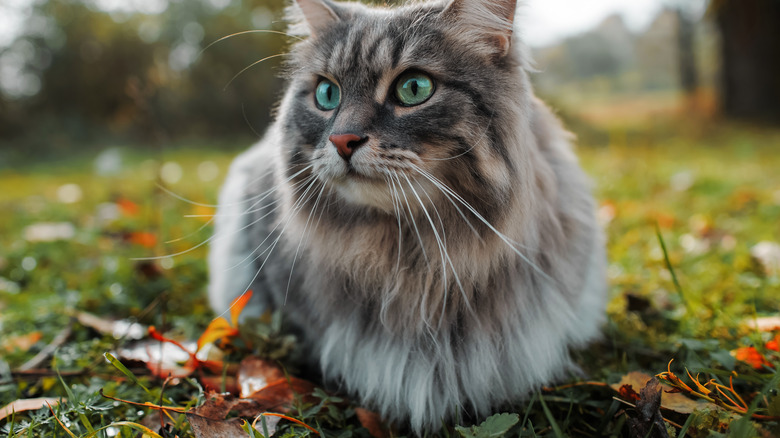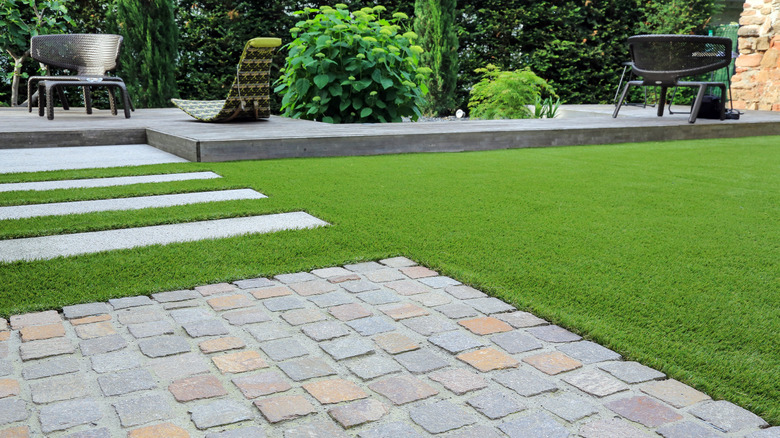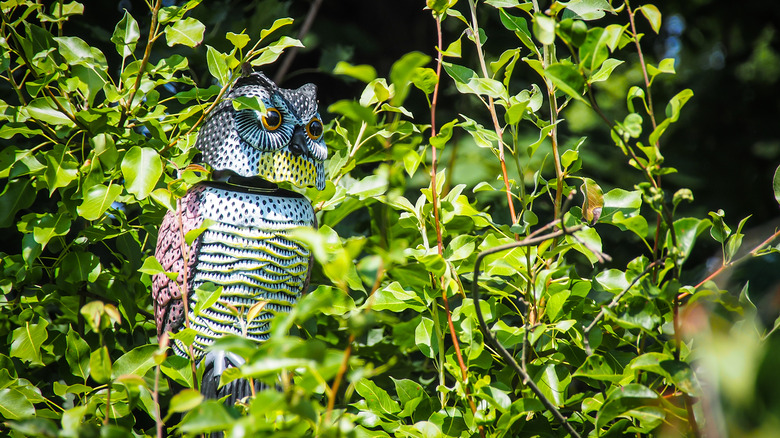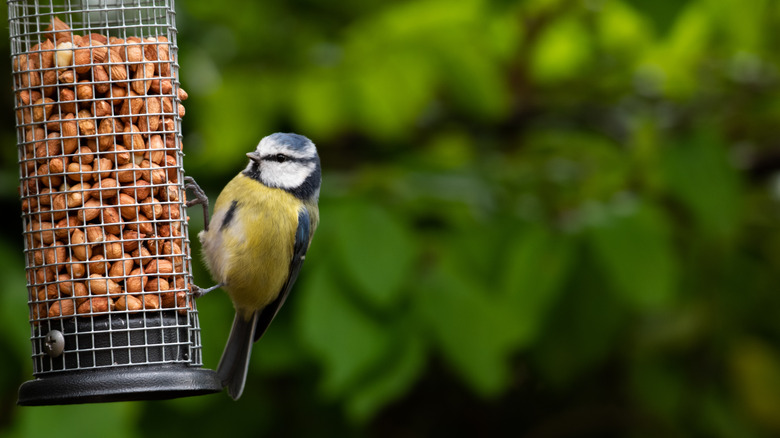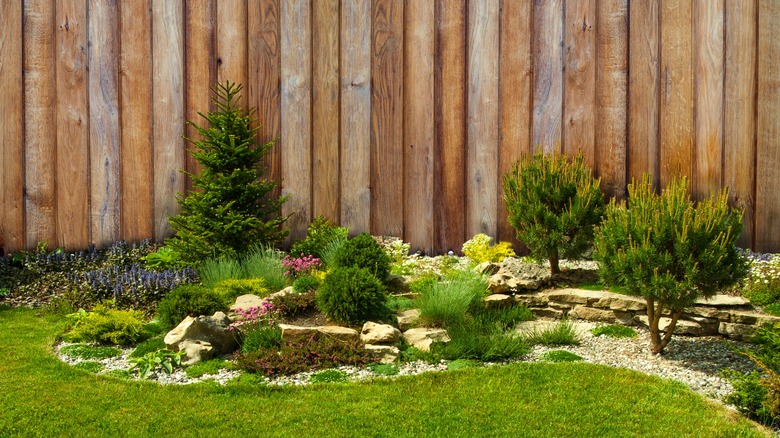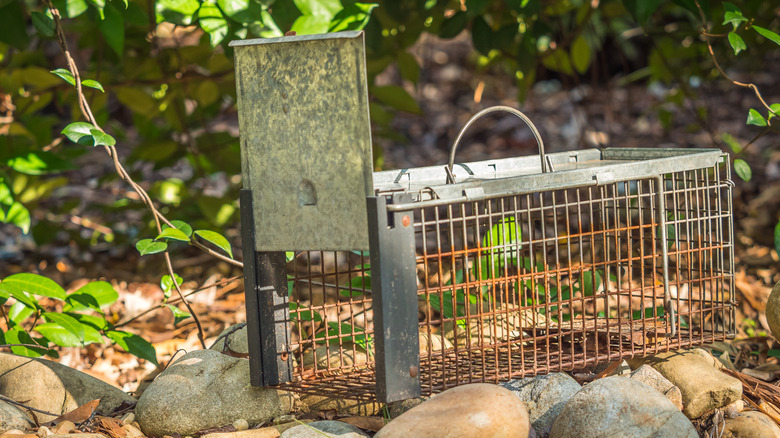8 Best Ways To Keep Chipmunks Out Of Your Garden
It's so rewarding to grow a garden. You watch with pride as the tiny seedlings grow into full-size plants; it seems magical when the chipmunks and bunnies start to visit. You can't wait to enjoy a fresh, juicy, home-grown tomato.
Then the chipmunks start to dig up your plants. Magic ruined.
In addition to digging up your precious garden, chipmunks love to burrow. According to Hava Hart, some of these burrows can be extremely deep and complex, providing the chipmunks with a place to hibernate and stash away food. Since chipmunks usually stay close to their burrows, turning your backyard into a chipmunk grocery store may encourage the animals to build their homes near yours.
Although many methods of keeping animals out of the garden are cruel, you can still protect your plants (and your lawn) humanely. Looking for ideas? Check out our top strategies to keep chipmunks out of your garden!
1. Spices are your friend
Have any dried hot spices on hand? Chipmunks hate spicy scents, so a little bit of dried chili or black pepper can work wonders to keep them away. According to Life in The Attic, you can even make an effective chipmunk repellant by spraying a mixture of ground cayenne pepper, garlic, and warm water on your plants — the animals are repelled by both scents!
Life in The Attic also mentions that this particular mixture is good for repelling other rodents, so it'll help with any mice that might be feasting on your sunflowers. Even better, they say that you can add soap to the recipe. Soap is known for acting as a powerful insecticide that can disrupt a bug's cell metabolism and destroy the barrier that protects their body's moisture (via SFGate). Since all of the ingredients are cheap (and things that you probably have on hand), it's the perfect method if you're struggling with a variety of pests.
2. Plant your crops strategically
Like we said before, chipmunks aren't fans of garlic. Though hot peppers don't usually give off an intense aroma while they're growing on the plant, a garlic plant's intense smell can be used to keep the critters away from your prized tulips.
Although a garlic plant on the other side of your garden might not be an effective deterrent, planting garlic around your garden's perimeter can ward off the chipmunks. If your garden is particularly large, you might find it more effective to place extra garlic near plants that your chipmunks seem to love.
Not a fan of garlic? According to Tips Bulletin, chipmunks are also repelled by onions, daffodils, and French marigolds, so strategic placement of these plants might save any crops that chipmunks seem to target. As a bonus, you'll get to enjoy fresh onions while cooking and your garden will be filled with lots of beautiful flowers!
3. Guard your plants with hair
Chipmunks, like many small creatures, are afraid of certain animals' scents. Looking for specific examples that can be used to your advantage? Chipmunks are afraid of cats and dogs — both of which are viewed as predators, according to Hyaenidae. If you don't want to keep your pets outside all the time, consider collecting some hair that has shed (or asking your local groomer for clippings). Then, sprinkle the hair around your plants and watch the chipmunks stay away.
If you're not interested in sprinkling animal fur on your veggies, why not use your own hair? Chipmunks are afraid of humans, so they're eager to avoid our hair which carries our scent (via Life in The Attic). You can grab some from your hairbrush, run your fingers through your hair and pull out any loose strands, or ask your hairdresser to collect the excess when you go for your next haircut. Just be very careful to cut the strands into small pieces — birds may be tempted to use long strands as a building material for nests but can get tangled in long pieces, potentially even severing a leg or wing (per Audubon).
4. Create open space
If you've been dealing with a chipmunk invasion and are thinking of redoing your backyard's landscaping, you have the perfect opportunity to make the land inhospitable to chipmunks. Since the animals are so small and must deal with quick predators, they generally hide in or behind whatever shelter they can find (think bushes, potted plants, rocks, and so on) but avoid open spaces, as noted by Hunker.
By creating as much open space as possible — whether you get rid of any small pots or completely rip out a few bushes as part of a larger landscape project — your backyard will become less appealing for chipmunks to visit or burrow in. As a bonus, it'll also be easier to spot any other creatures (whether they're lone chipmunks or other pests), making it easier to identify which measures you should take in the future to ensure that your garden is pest-free.
5. Invest in a fake owl
In addition to cats and dogs, chipmunks are also terrified of owls, which are one of their largest predators (via Squirrels at the Feeder). In fact, they even have a warning system to alert other chipmunks if a threat is in the area. If only there was a way to get the chipmunks to warn each other about your garden ...
Hesitant to attract predators to your garden? Fair enough! Luckily, a fake owl can still do the trick. According to Pest Lockdown, fake owls can be effective deterrents against chipmunks but rodents may eventually catch on that the threat isn't real. To keep them terrified (and out of your yard), you should place the owl in a tree branch and move its location every few days. The site also recommends positioning reflective tape and wind chimes near your fake owl to make it more intimidating and discourage brave chipmunks from getting too close.
6. Move your bird feeder away from the garden
Although bird feeders are a great way to make your garden more lively (and take care of the local birds), you may be left with loose nuts or seeds at the base or scattered around the ground. For chipmunks, this is an open invitation to a feast. Since seeds and nuts take a relatively long time to go bad, chipmunks usually stockpile them to eat during the winter, per Encyclopedia Britannica. They need quite a few to last the whole season, making free overflow from a bird feeder particularly helpful. It's no wonder that they keep coming back!
If you have a bird feeder, it might be best to move it to a separate area on your property. For example, if your garden is in your backyard, consider moving the bird feeder to your front yard. Ideally, you want to put as much distance as possible between your plants and any loose seeds so that chipmunks are not tempted to head to the garden for dessert.
7. Put up fences
If you've tried a few methods to get rid of chipmunks but haven't had any luck yet, you might want to try adding a fence. Since chipmunks are great climbers and burrow up to 3 feet underground, according to SFGate, fences generally aren't the best repellent so we don't recommend them as a first step (or as your only line of defense). After all, you'd need a very tall and deep fence to keep chipmunks out on their own. They might be annoying, but the rodents probably aren't worth digging a 3-foot trench over.
With that being said, if you're already using a few chipmunk deterrents, a fence may be the extra little push that finally makes your garden more trouble than it's worth for them. A chipmunk might still be willing to waltz into your garden and brave some pepper spray to eat your tulips, but it's more work to burrow underneath the fence. Similarly, you may not have as many chipmunk burrows in your garden if the chipmunks have to jump over the fence every time they want to hunt for food.
8. Use a large (and humane) trap
Although they aren't our favourite way to get rid of chipmunks, humane traps are a good last-ditch effort if nothing else works. These traps contain the animals in a cage (but do not kill them) so that you can release them in an area far from your home. According to Bob Vila, you should choose a long cage-style trap (around 10 to 20 inches long), wear gloves while setting it up since chipmunks will avoid anything with your scent, and use peanuts, sunflower seeds, or peanut butter as bait. It is very important to check the trap frequently so that any captured animals do not perish. You should also release any captured animals promptly — just be sure to drive far enough from your home that they won't be a problem again.
If you know that you'll be busy or away from home for a few days, move the trap inside so you don't accidentally capture any creatures that you can't release in time. Also, be sure to check local regulations before setting any traps.
